Unit 4 Don't eat in class Section A 1a-1c 课件+音频 (共31张PPT)人教版英语七年级下册
文档属性
| 名称 | Unit 4 Don't eat in class Section A 1a-1c 课件+音频 (共31张PPT)人教版英语七年级下册 |  | |
| 格式 | pptx | ||
| 文件大小 | 3.3MB | ||
| 资源类型 | 教案 | ||
| 版本资源 | 人教新目标(Go for it)版 | ||
| 科目 | 英语 | ||
| 更新时间 | 2024-01-01 19:53:55 | ||
图片预览

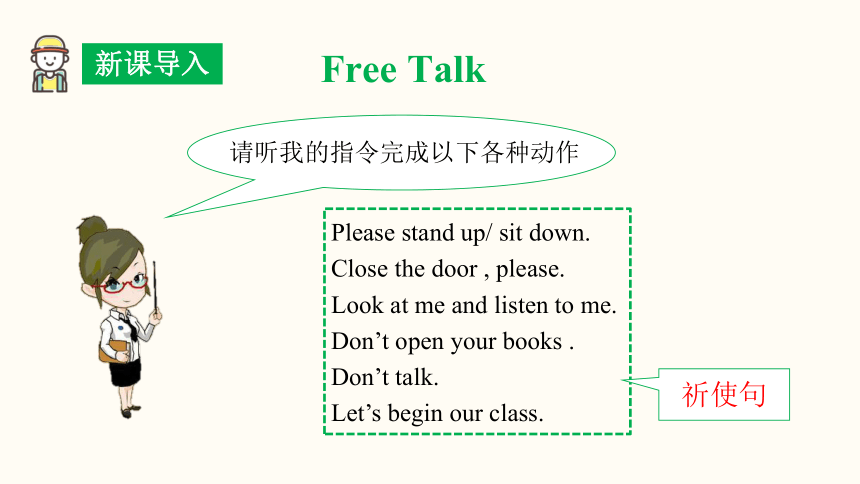
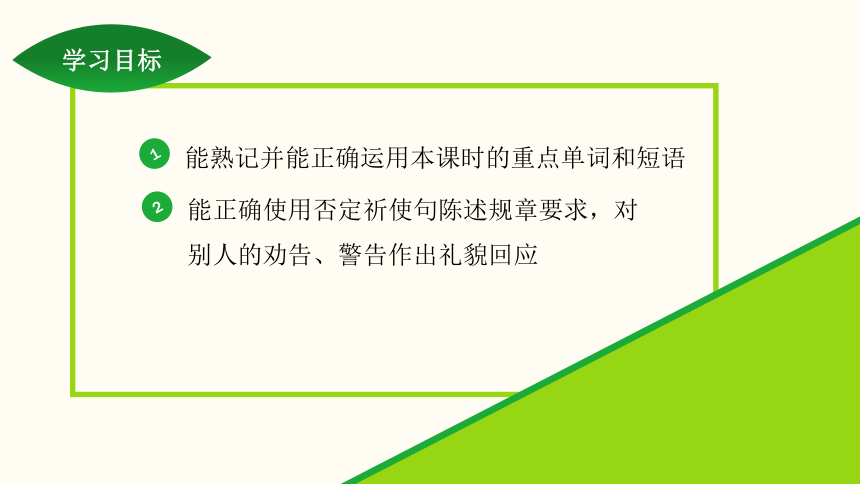
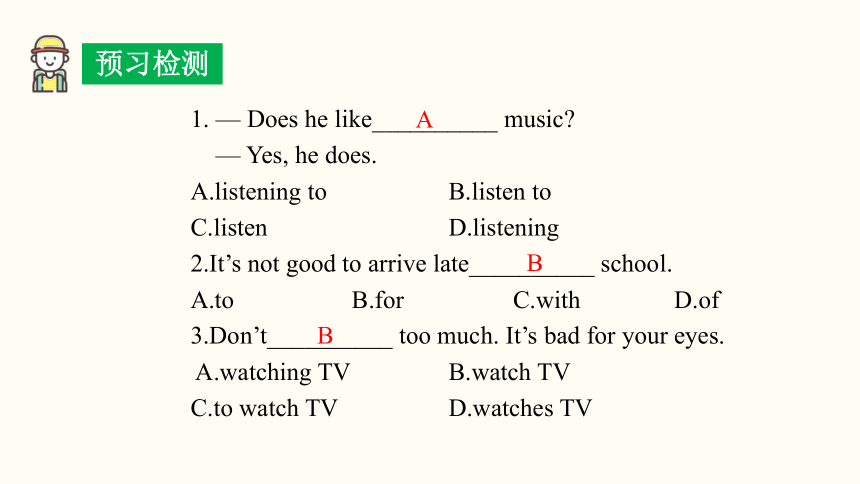
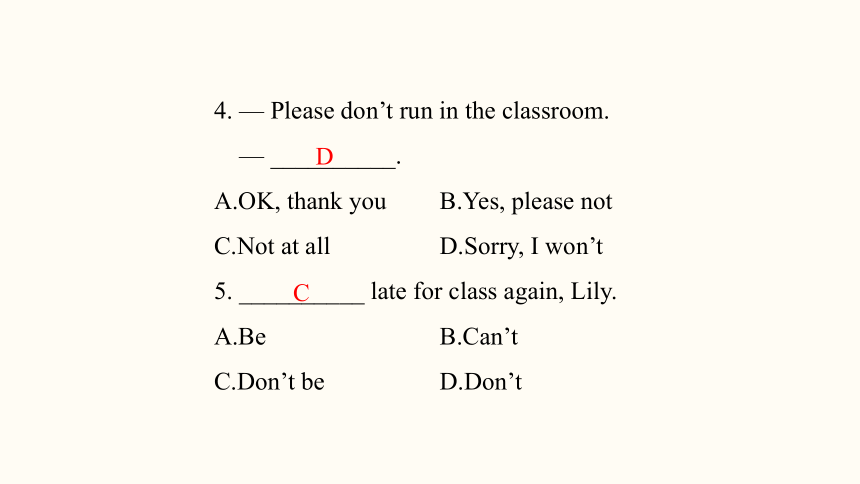
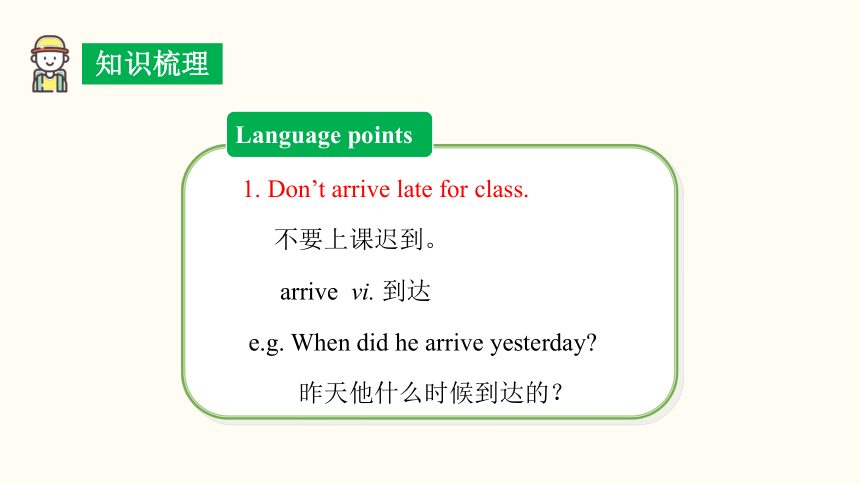

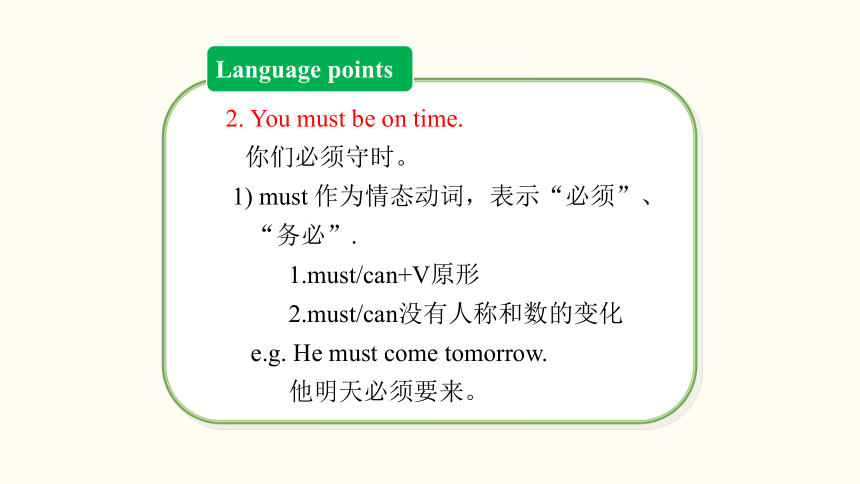
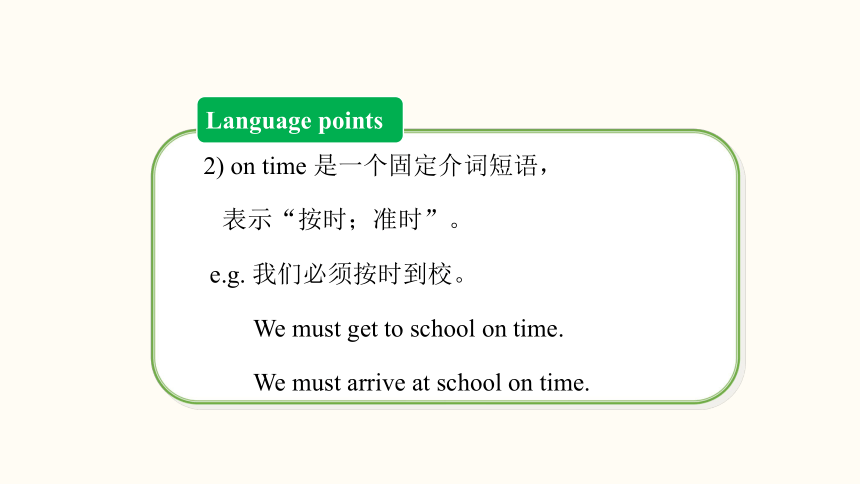

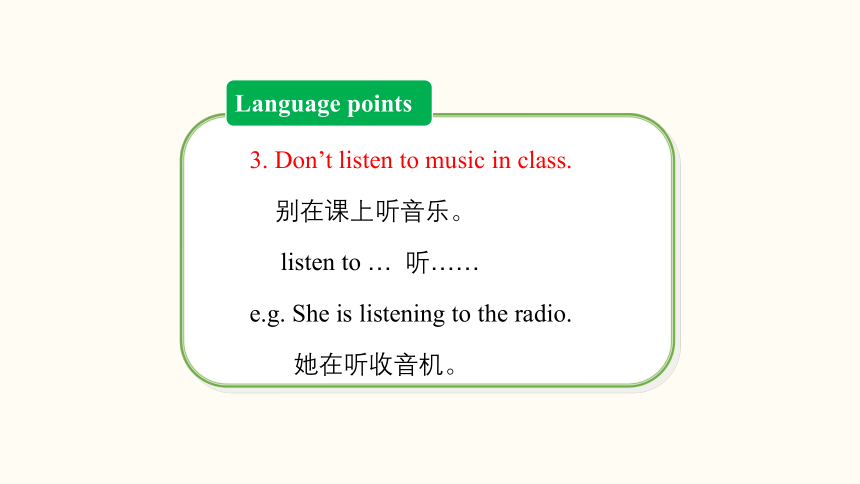
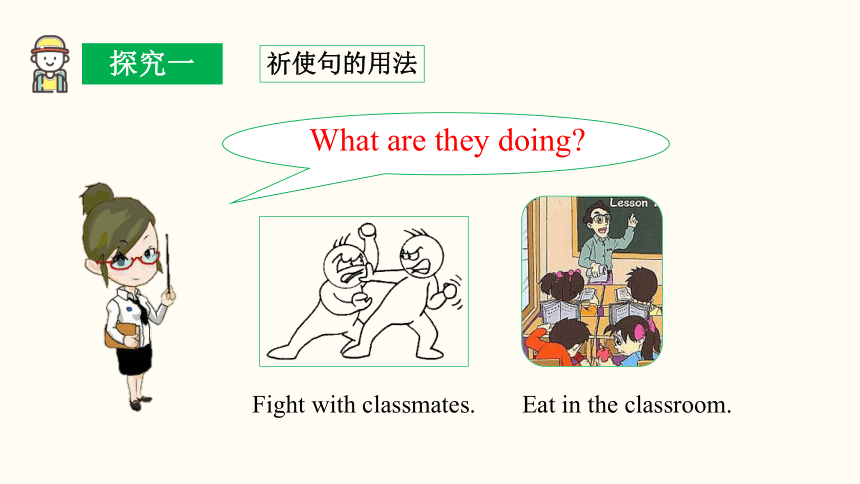
文档简介
(共31张PPT)
Unit 4
Don’t eat in class.
Section A (1a~1c)
新课导入
Free Talk
请听我的指令完成以下各种动作
Please stand up/ sit down.
Close the door , please.
Look at me and listen to me.
Don’t open your books .
Don’t talk.
Let’s begin our class.
祈使句
1
2
能熟记并能正确运用本课时的重点单词和短语
能正确使用否定祈使句陈述规章要求,对
别人的劝告、警告作出礼貌回应
预习检测
1. — Does he like__________ music
— Yes, he does.
A.listening to B.listen to
C.listen D.listening
2.It’s not good to arrive late__________ school.
A.to B.for C.with D.of
3.Don’t__________ too much. It’s bad for your eyes.
A.watching TV B.watch TV
C.to watch TV D.watches TV
A
B
B
4. — Please don’t run in the classroom.
— __________.
A.OK, thank you B.Yes, please not
C.Not at all D.Sorry, I won’t
5. __________ late for class again, Lily.
A.Be B.Can’t
C.Don’t be D.Don’t
D
C
知识梳理
Language points
1. Don’t arrive late for class.
不要上课迟到。
arrive vi. 到达
e.g. When did he arrive yesterday
昨天他什么时候到达的?
Language points
【辨别】arrive in / at与get to
arrive + in (大地方)
at (小地方)
get 必须与to 搭配才能加宾语。
后面如接地点副词,则不用介词to。
arrive in Shanghai arrive at school
get to Shanghai / get to school
Language points
2. You must be on time.
你们必须守时。
1) must 作为情态动词,表示“必须”、
“务必”.
1.must/can+V原形
2.must/can没有人称和数的变化
e.g. He must come tomorrow.
他明天必须要来。
Language points
2) on time 是一个固定介词短语,
表示“按时;准时”。
e.g. 我们必须按时到校。
We must get to school on time.
We must arrive at school on time.
Language points
3) 系动词be与形容词或介词短语联用,是英语一种常见的语句结构,表示某种状态。
e.g. be quiet 保持安静
be on time 守时;按时到;
be at work 在上班
Language points
3. Don’t listen to music in class.
别在课上听音乐。
listen to … 听……
e.g. She is listening to the radio.
她在听收音机。
探究一
祈使句的用法
What are they doing
Fight with classmates.
Eat in the classroom.
What is she/he doing
Listen to music in class.
Arrive late for class.
他们能在学校里做这些事情吗?
如果不能,我们要怎么对他/她说?
Don’t fight with your classmates.
Don’t eat in the classroom.
You must eat in the dining hall.
思考
Don’t listen to music in class.
Don’t arrive late for class.
肯定祈使句 否定祈使句
Sit down.
Come in.
Eat at home.
祈使句的用法:
1.祈使句是表示命令、叮嘱、号召等的句子;
2.以动词原形开头;
3.通常省略主语you;
4.祈使句有肯定和否定两种。
Don’t sit down.
Don’t come in .
Don’t eat at home.
1a Which rules are these students breaking Write
the number of the rule next to the student.
SCHOOL RULES
1. Don’t arrive late for class. You must be on time.
2. Don’t run in the hallways.
3. Don’t eat in the classroom. You must eat in the
dining hall.
4. Don’t listen to music in class.
5. Don’t fight.
SCHOOL RULES
1、上课不要迟到
Don’t arrive late for class. You must be on time.
2、不要在走廊上跑
Don’t run in the hallways.
3、不要在教室里吃东西
Don’t eat in the classroom.You must eat in the dining hall.
4、不要在课上听音乐
Don’t listen to music in class.
5、不要打架
Don’t fight.
2. Don’t run in the
hallways.
4. Don’t listen to
music in class.
5. Don’t fight.
1. Don’t arrive late for class. You must be on time.
4
3
2
5
3. Don’t eat in the
classroom. You must eat in the dining hall.
1b Listen. What rules are these students breaking
Write the numbers after the names.
Peter ______ Amy ______ Mike ______
2
3
4
Pair work
两人一组,一个学生表演违反校规的行为,另一名学生制止他,可以交换角色。
当堂检测见DCF课件
活动小结
通过以上的活动可知,祈使句是用来表示1.___________________________等的句子,说话的对象大多是第二人称you,且常被省略。肯定句常以2.____________开头,否定句常以3.__________开头,句末用感叹号或句号,读时用降调。
请求, 命令, 劝说, 号召, 警告
动词原形
don’t
探究二
can和must表达规则的用法
1c Student A is a new student. Student B tells Student A
about the rules above.
Well, we can’t arrive late for class. We must be on time.
What are the rules
Pair work
What are the other rules
We can't eat in the classroom.
You must eat in the dining hall.
Group work
We can't eat in the classroom. You must eat
in the dining hall.
We can’t arrive late for class. We must be on time.
以小组为单位讨论下面句子的特点。
a. 祈使句是用来表示请求, 命令, 劝说,
号召, 警告等的句子;
b. can(not) 和must 都是情态动词,后面接
动词原形;
c. can't表示不能做的事情,must表示必须
做的事情。
Pair work
两人一组结合can't和must来
谈论自己家里的家规。
What are your home rules
I can't eat in my bed.
I must eat in the dining room.
……
What are your home rules
当堂检测见DCF课件
活动小结
通过以上的活动,我们可以知道,can’t用来表示1.__________________________,must用来表示2.___________________,这两个都是3._________动词,因此后面的动词用4.____________。
不能做的事情
必须做的事情
情态
原形
当堂检测
一、根据句意及首字母提示完成单词。
1. Don’t l to music in class.
2. There are too many r in our school.
3. You must (be) more careful next time.
4. Don't f________ with your classmates.
5. You can't eat in the classroom. You must eat in the d_________ hall
isten
ules
be
ight
ining
二、句型转换。
1. You can’t be late for school.(改为否定祈使句)
late for school.
2. Do your homework at school!(改为否定句)
_______ _______ your homework at school!
3. You must make the bed every day.(改为同义句)
You make the bed every day.
Don’t be
Don’t do
have to
课堂总结
祈使句的用法
can't、must表达规则的用法
Unit 4
Section A (1a~1c)
Unit 4
Don’t eat in class.
Section A (1a~1c)
新课导入
Free Talk
请听我的指令完成以下各种动作
Please stand up/ sit down.
Close the door , please.
Look at me and listen to me.
Don’t open your books .
Don’t talk.
Let’s begin our class.
祈使句
1
2
能熟记并能正确运用本课时的重点单词和短语
能正确使用否定祈使句陈述规章要求,对
别人的劝告、警告作出礼貌回应
预习检测
1. — Does he like__________ music
— Yes, he does.
A.listening to B.listen to
C.listen D.listening
2.It’s not good to arrive late__________ school.
A.to B.for C.with D.of
3.Don’t__________ too much. It’s bad for your eyes.
A.watching TV B.watch TV
C.to watch TV D.watches TV
A
B
B
4. — Please don’t run in the classroom.
— __________.
A.OK, thank you B.Yes, please not
C.Not at all D.Sorry, I won’t
5. __________ late for class again, Lily.
A.Be B.Can’t
C.Don’t be D.Don’t
D
C
知识梳理
Language points
1. Don’t arrive late for class.
不要上课迟到。
arrive vi. 到达
e.g. When did he arrive yesterday
昨天他什么时候到达的?
Language points
【辨别】arrive in / at与get to
arrive + in (大地方)
at (小地方)
get 必须与to 搭配才能加宾语。
后面如接地点副词,则不用介词to。
arrive in Shanghai arrive at school
get to Shanghai / get to school
Language points
2. You must be on time.
你们必须守时。
1) must 作为情态动词,表示“必须”、
“务必”.
1.must/can+V原形
2.must/can没有人称和数的变化
e.g. He must come tomorrow.
他明天必须要来。
Language points
2) on time 是一个固定介词短语,
表示“按时;准时”。
e.g. 我们必须按时到校。
We must get to school on time.
We must arrive at school on time.
Language points
3) 系动词be与形容词或介词短语联用,是英语一种常见的语句结构,表示某种状态。
e.g. be quiet 保持安静
be on time 守时;按时到;
be at work 在上班
Language points
3. Don’t listen to music in class.
别在课上听音乐。
listen to … 听……
e.g. She is listening to the radio.
她在听收音机。
探究一
祈使句的用法
What are they doing
Fight with classmates.
Eat in the classroom.
What is she/he doing
Listen to music in class.
Arrive late for class.
他们能在学校里做这些事情吗?
如果不能,我们要怎么对他/她说?
Don’t fight with your classmates.
Don’t eat in the classroom.
You must eat in the dining hall.
思考
Don’t listen to music in class.
Don’t arrive late for class.
肯定祈使句 否定祈使句
Sit down.
Come in.
Eat at home.
祈使句的用法:
1.祈使句是表示命令、叮嘱、号召等的句子;
2.以动词原形开头;
3.通常省略主语you;
4.祈使句有肯定和否定两种。
Don’t sit down.
Don’t come in .
Don’t eat at home.
1a Which rules are these students breaking Write
the number of the rule next to the student.
SCHOOL RULES
1. Don’t arrive late for class. You must be on time.
2. Don’t run in the hallways.
3. Don’t eat in the classroom. You must eat in the
dining hall.
4. Don’t listen to music in class.
5. Don’t fight.
SCHOOL RULES
1、上课不要迟到
Don’t arrive late for class. You must be on time.
2、不要在走廊上跑
Don’t run in the hallways.
3、不要在教室里吃东西
Don’t eat in the classroom.You must eat in the dining hall.
4、不要在课上听音乐
Don’t listen to music in class.
5、不要打架
Don’t fight.
2. Don’t run in the
hallways.
4. Don’t listen to
music in class.
5. Don’t fight.
1. Don’t arrive late for class. You must be on time.
4
3
2
5
3. Don’t eat in the
classroom. You must eat in the dining hall.
1b Listen. What rules are these students breaking
Write the numbers after the names.
Peter ______ Amy ______ Mike ______
2
3
4
Pair work
两人一组,一个学生表演违反校规的行为,另一名学生制止他,可以交换角色。
当堂检测见DCF课件
活动小结
通过以上的活动可知,祈使句是用来表示1.___________________________等的句子,说话的对象大多是第二人称you,且常被省略。肯定句常以2.____________开头,否定句常以3.__________开头,句末用感叹号或句号,读时用降调。
请求, 命令, 劝说, 号召, 警告
动词原形
don’t
探究二
can和must表达规则的用法
1c Student A is a new student. Student B tells Student A
about the rules above.
Well, we can’t arrive late for class. We must be on time.
What are the rules
Pair work
What are the other rules
We can't eat in the classroom.
You must eat in the dining hall.
Group work
We can't eat in the classroom. You must eat
in the dining hall.
We can’t arrive late for class. We must be on time.
以小组为单位讨论下面句子的特点。
a. 祈使句是用来表示请求, 命令, 劝说,
号召, 警告等的句子;
b. can(not) 和must 都是情态动词,后面接
动词原形;
c. can't表示不能做的事情,must表示必须
做的事情。
Pair work
两人一组结合can't和must来
谈论自己家里的家规。
What are your home rules
I can't eat in my bed.
I must eat in the dining room.
……
What are your home rules
当堂检测见DCF课件
活动小结
通过以上的活动,我们可以知道,can’t用来表示1.__________________________,must用来表示2.___________________,这两个都是3._________动词,因此后面的动词用4.____________。
不能做的事情
必须做的事情
情态
原形
当堂检测
一、根据句意及首字母提示完成单词。
1. Don’t l to music in class.
2. There are too many r in our school.
3. You must (be) more careful next time.
4. Don't f________ with your classmates.
5. You can't eat in the classroom. You must eat in the d_________ hall
isten
ules
be
ight
ining
二、句型转换。
1. You can’t be late for school.(改为否定祈使句)
late for school.
2. Do your homework at school!(改为否定句)
_______ _______ your homework at school!
3. You must make the bed every day.(改为同义句)
You make the bed every day.
Don’t be
Don’t do
have to
课堂总结
祈使句的用法
can't、must表达规则的用法
Unit 4
Section A (1a~1c)
同课章节目录
- Unit 1 Can you play the guitar?
- Section A
- Section B
- Unit 2 What time do you go to school?
- Section A
- Section B
- Unit 3 How do you get to school?
- Section A
- Section B
- Unit 4 Don't eat in class.
- Section A
- Section B
- Unit 5 Why do you like pandas?
- Section A
- Section B
- Unit 6 I'm watching TV.
- Section A
- Section B
- Review of Units 1-6
- Unit 7 It's raining!
- Section A
- Section B
- Unit 8 Is there a post office near here?
- Section A
- Section B
- Unit 9 What does he look like?
- Section A
- Section B
- Unit 10 I'd like some noodles.
- Section A
- Section B
- Unit 11 How was your school trip?
- Section A
- Section B
- Unit 12 What did you do last weekend?
- Section A
- Section B
